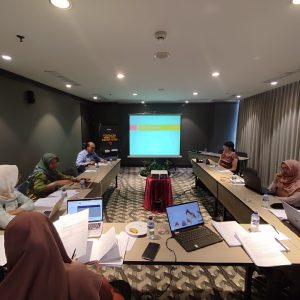Center of Reproductive Health is dedicated to implement three missions of higher education or university (Tri Darma Perguruan Tinggi), which aims at achieving goals to be a center of excellence and innovation on reproductive health research, demographic and health surveillance, and educational activities to increase population health status. Its main objectives are: 1) to undertake demographic and public surveillance at household level to understand reproductive health behavior as well as descriptive health, nutritional, epidemiologic, demographic, and social-economic determinants that are fundamentals to health planning and provision of reproductive health care services; 2) to develop public health prevention and intervention actions to accelerate the achievement of MDGs goal related to reproductive health problems, including development of new contraceptive technology; 3) to evaluate effectiveness and efficiencies of reproductive health programs targeted to large population, such as screening, immunization or vaccination program for mother and children, and micronutrient and food supplementation program for targeted group; 4) to offer facilities for degree and non-degree training on public health and reproductive health sciences that apply demographic and health surveillance.
Department of MCH-RH has been establishing a community and health and nutrition research laboratory (CHN-RL) since the late of 1994. The CHN-RL has been used to facilitate the faculty and students’ researches, as well as efforts to test new an intervention and training area for the Government’s worker. CHNRL based at Purworedjo district, offers the opportunity to gain experience in data collection and analysis of large-scale population-and clinical-based epidemiological studies. Students and researchers also have the opportunity to pursue gynecological as well as reproductive health topics at the Sardjito Hospital, to name a few of the extensive resources available. The CHN-RL is member of INDEPTH Network, which link scientist working in population and demography across the world. Students and researchers may also collaborate with other faculty members at the Department Obstetrics and Gynecology and Pediatrics, and the Sardjito-affiliated hospitals.
Some of the collaborative research that has been successfully completed in the past are:
- Impact evaluation of vitamin A supplementation on maternal & neonatal infection & prematurity; CHNRL-Mother Care Applied Research Program. John Snow Inc. Arlington, Virginia, U.S.A; July 1995 – June 1997.
- The effect of reproduction on the energy stores of women; CHNRL-Faculty of Medicine Gadjah Mada University – Swedish Agency for Research Cooperation with Developing Countries (SAREC); July 1994 – July 1998.
- Development of Simple Breastmilk Indicators to Assess Vit A and Iodine Deficiencies in Communities. (Yodivita); CHNRL -The John Hopkins University; June 1995 – May 1996.
- Impact of Domestic Violence on Maternal and Infant Health and Nutritional Status : A Cohort Study in Purworejo District; CHN-RL – Department of Public Health & Clinical Medicine Umeå University; Rifka Annisa Women Crisis Center – Center for Health and Gender Equity Washington, USA.
- Strengthening of Leadership Capacity of Human Resources on Reproductive Health Programs to Support the Decentralization of Health Services in Indonesia; CHN-RL – Bill-Melinda Gates Foundation – JHU; July 2003 – Aug 2005.
- ROTAVIRUS – Surveillance to determine the disease burden and the epidemiology rotavirus in Indonesia; CHN-RL – Department of Pediatrics/Dr. Sardjito Hospital – Department of Microbiology, Faculty of Medicine, GMU – Respiratory and Enteric Virus Brach National Center for Infectious Diseases CDC, ADIP and Respiratory and Enteric Virus Brach National Center for Infectious Diseases CDC; 2003 – 2004.



